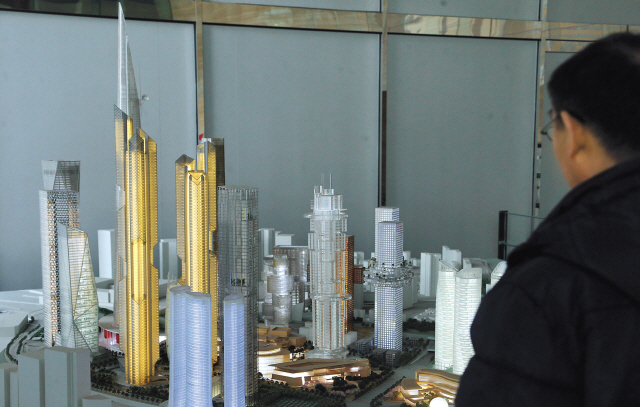Yongsan development project still faces uncertain future
Developer may buy time to avoid bankruptcies as it is likely to get compensation
By Seo Jee-yeonPublished : Feb. 7, 2013 - 21:20
The nation’s biggest property development project to build an international business district in Yongsan, central Seoul, by 2016 is fending off bankruptcy amid difficulties in financing the construction of the landmark 150-story Dream Tower, the centerpiece of the project.
The board of Dream Hub, which is responsible for the financing and planning of the Yongsan development project, convened a meeting Thursday to discuss ways to extend a lifeline to the project, but failed to draw an agreement. Instead, KORAIL and Lotte Tour Development, the two major shareholders of Dream Hub, clashed over how to resuscitate the project.
The board of Dream Hub, which is responsible for the financing and planning of the Yongsan development project, convened a meeting Thursday to discuss ways to extend a lifeline to the project, but failed to draw an agreement. Instead, KORAIL and Lotte Tour Development, the two major shareholders of Dream Hub, clashed over how to resuscitate the project.

Capital for the project has been drying up since the company’s failure to raise funds in September last year to continue Dream Tower’s construction. After demolishing the previous structure, the project has since been in limbo and has yet to break ground.
Market watchers have said the future of the Yongsan development project in the short term depends on whether Dream Hub will be able to boost capital before the late March deadline to pay back investment loan interest amounting to 5.9 billion won ($5 million). The funding for Dream Hub, which started at 1 trillion won ($900 million), has dwindled to less than 500 million won.
But the developer may buy more time to avoid bankruptcies as it is expected to receive compensation amounting to 42 billion won from the government. A court ruled Thursday that the Korea Post should pay 42 billion won to the developer for having used the site for development without permission.
Despite the temporary fund injection, the project seemingly faces a bumpy road.
In 2007, when Seoul City unveiled a bold development plan to transform 560,000 square meters ― including KORAIL’s gigantic maintenance shop in Yongsan ― into an international business district, outlooks overflowed with optimism that the plan would liven up Seoul’s metropolitan faade. The highlight of the plan was to build a 665-meter-tall, 150-story, landmark multi-purpose commercial building, to be named Dream Tower.
Based on those rosy outlooks, about 30 companies, from state-run to asset management to construction, joined Dream Hub to lead the Yongsan project.
State-run KORAIL, which owns most of the land for the Yongsan project, also jumped into the project, taking the biggest slice of the pie with a 25 percent shareholding. Lotte Tour Development and KB Asset Management followed with 15 percent and 10 percent, respectively.
The 10-member board of Dream Hub, however, started to express misgivings when the local real estate bubble burst in 2008, affected by the global financial crisis.
The project seemed to normalize in July 2011, when KORAIL said it would support the financing for the construction of Dream Tower in phases, under the condition that every shareholder should take responsibility for increasing capital by issuing convertible bonds based on their shareholdings. But the second round of capital increases through CB issuances failed in December last year, and KORAIL stopped injecting funds.
“The Yongsan development project was designed to be a private project from the beginning. Twenty-eight of the Dream Hub’s 30 shareholders, aside from KORAIL and SH Corp., are private companies. KORAIL cannot continue to inject funds as a state-run company without the shared responsibility of the other private shareholders,” a KORAIL official said.
Lotte Tour Development and other private shareholders, however, criticized the manner of financing that KORAIL proposed.
“It is nonsense to force all shareholders to take responsibility for financing. Shareholders have a different business situation. For instance, it is hard for construction firms like us to inject more funds into the project during a business slump. We need a different method of financing,” said an official from the Lotte Tour Development, claiming that a lawsuit could be in the future unless KORAIL changes its stance on financing.
Market watchers said it seems difficult for the two major shareholders to settle their differences as the public and private sectors solve conflicts differently. Growing doubt over the profitability of the project amid the protracted downturn in the real estate market is another challenge facing Dream Hub.
“No one wants to see the failure of the project, but it is time to review it objectively and change the development strategy to prevent a bigger disaster,” a KORAIL official said.
Lotte Tour Development and other private shareholders insisted the project will return profit to shareholders, if completed as planned.
If the project fails shareholders from the private sector are expected to be hit harder than KORAIL which will get the land back.
“Regardless of the financing issue, it is obvious that the development project will be protracted, as the Dream Tower ― which was supposed to be completed in 2016 ― has yet to break ground,” the KORAIL official said. Under the Dream Hub plan, construction of the building should be completed in four years.
By Seo Jee-yeon (jyseo@heraldcorp.com)







![[Graphic News] More Koreans say they plan long-distance trips this year](http://res.heraldm.com/phpwas/restmb_idxmake.php?idx=644&simg=/content/image/2024/04/17/20240417050828_0.gif&u=)
![[KH Explains] Hyundai's full hybrid edge to pay off amid slow transition to pure EVs](http://res.heraldm.com/phpwas/restmb_idxmake.php?idx=644&simg=/content/image/2024/04/18/20240418050645_0.jpg&u=20240419100350)





![[From the Scene] Monks, Buddhists hail return of remains of Buddhas](http://res.heraldm.com/phpwas/restmb_idxmake.php?idx=652&simg=/content/image/2024/04/19/20240419050617_0.jpg&u=20240419175937)

![[KH Explains] Hyundai's full hybrid edge to pay off amid slow transition to pure EVs](http://res.heraldm.com/phpwas/restmb_idxmake.php?idx=652&simg=/content/image/2024/04/18/20240418050645_0.jpg&u=20240419100350)

![[Today’s K-pop] Illit drops debut single remix](http://res.heraldm.com/phpwas/restmb_idxmake.php?idx=642&simg=/content/image/2024/04/19/20240419050612_0.jpg&u=)